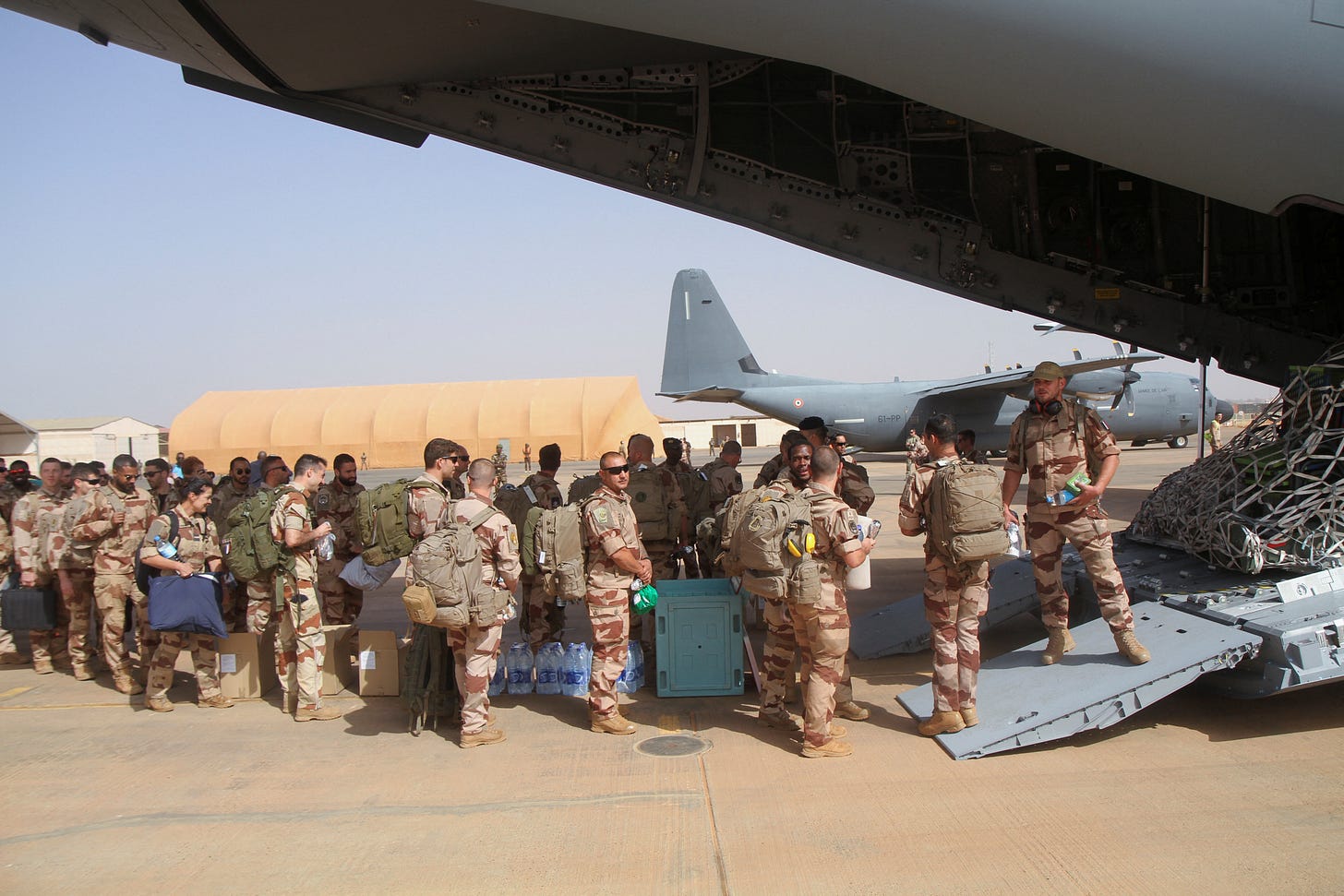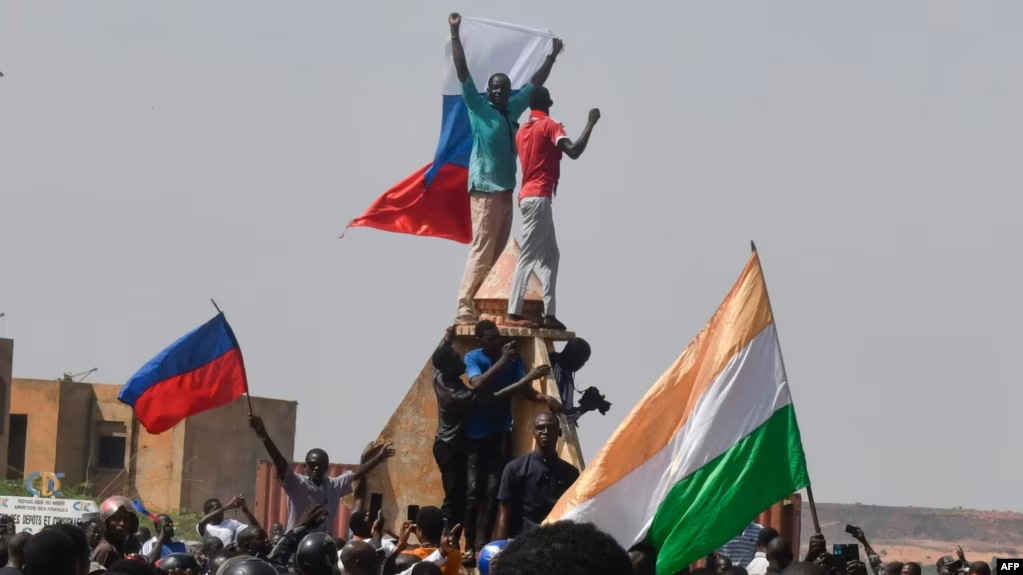France's Grip On the Sahel Continues To Slip Following Niger Withdrawal
Niger's former colonial power appears to have fully exited the country - at least on the surface.
Thousands gathered outside the embassy of France in the Nigerien capital of Niamey last September to demand French troops withdraw from their country. Source
On August 1, 2023, France told its citizens living in Niger that it was time.
Over the next several days, almost 600 French nationals and foreign citizens fled by the planeload. This departure came after the fall of President Mohamed Bazoum's government at the hands of his presidential guard just six days prior. Crowds of angry protesters gathered outside the French embassy in Niamey, accusing the country's former colonial power of plotting to intervene militarily.
France's once expansive power in the Sahel is under significant threat amid a wave of coups in the region, of which Niger is one of five to occur in the past three years. With Niger having now severed military and diplomatic ties with France, Russia is moving in as a significant foreign partner for the new regime. Although these developments have sweeping implications for France's economic and geopolitical interests in the region, French influence there is likely to remain in some form moving forward.
New agreements, shifting paradigms
Last December, France finalized the complete withdrawal of its 1,500 troops that remained in Niger in response to the demands of junta leader and de-facto president, General Abdourahamane Tchiani. Although once-hailed as a bastion of stability in West Africa, Niger remains one of the world's least developed countries. Niger must also contend with the rising threat of jihadist militants that regularly enter its territory via its porous eastern borders with Mali and Burkina Faso. Before its withdrawal, France played a significant security role in Niger and neighbouring countries, whose governments have long struggled with weak institutions and armed conflict.
The French military withdrawal from Niger represents a massive change for the region. While last year's coup resulted in the cancellation of five military accords between the two countries, Nigerien military leaders claimed to be highly satisfied with their cooperation with French counterparts less than a year prior. French military support in Niger was previously instrumental in combating extremism in the tri-border region between Niger, Mali, and Burkina Faso. In previous operations, France led a force of 4,500 French and regional soldiers in Operation Barkhane, which conducted operations against major terrorist threats from Jama'at Nusrat al-Islam wa al-Muslimeen (JNIM) and Almansour Ag Alkassoum across the region.
Paris has refused to recognize the junta, which ordered the French ambassador to leave last August. In January, the European Union imposed sanctions on Niger in response to the coup. Regionally, members of the Economic Community of West African States – of which Niger was a member until January 27 – initially assembled a standing force to threaten military action against the junta. However, ECOWAS has yet to move on this threat, and at least one top military official from the bloc claims that such an intervention is unlikely to move forward. Instead, Niger, along with Burkina Faso and Mali – also former ECOWAS member states – formed the Alliance of Sahel States (AES) last December, a mutual defence pact that promises military cooperation in the event of foreign intervention. AES member states also enjoy close relations with Russia, with Moscow's presence in Niger on the rise in recent months.
The last French troops left Niger on December 22, 2023. Source
French interests and practices in Niger
Although France's colonial rule over Niger and other Sahel countries ended in 1958, Paris continues to wield substantial power in the region, benefitting greatly from its natural resources. In Niger, France's primary economic interests lay in the country's vast mineral reserves and its potential as an energy corridor. However, France's economic influence over Niger has been increasingly called into question by the new regime.
Niger is home to the world's seventh-largest proven uranium reserves and is also a major exporter of gold. In 2022, Niger was France's second largest supplier of uranium, a resource vital for France's nuclear energy sector, which supplies some 70 percent of the country's electricity needs. The largest uranium mining firm in Niger is Orano, a global conglomerate that is 90% owned by the French government. Although the coup has suspended new mining leases, Orano continues to operate at the three sites where it maintains majority stakes. However, Orano reports that its Niger operations are hindered by the closure of the country's leading supply corridor, limiting access to chemical products needed for its mining operations.
France's mining presence in Niger has been highly controversial. French state-owned conglomerate AREVA (the predecessor of Orano) promised to build a 'Little Paris' in the town of Arlit when it started mining operations nearby in 1968. However, the town that now has some 117,000 residents has a death rate rise that is twice the national average due to factors such as groundwater contamination and radioactive dust from nearby mining sites. Uranium mining is water intensive, and residents of Arlit report that some neighbourhoods go without water for three weeks at a time. 2014 Oxfam noted a lack of transparency in AREVA's negotiations with previous Nigerien governments that worked to its benefit. In 2020, former French intelligence agent Marc Eichinger came forth with allegations of numerous corrupt dealings spanning decades on the part of AREVA in Niger.
In addition to French mining interests, Niger's latest coup also threatens European energy security as questions emerge as to whether the junta will support the 4,128-kilometer $13 billion Trans-Sahara Pipeline that runs through Nigerien territory. This pipeline would deliver 30 billion cubic meters to the European energy market daily when France and other European countries continue to struggle with high energy prices due to the ongoing war in Ukraine. There is no word yet as to whether the project will move forward.
France maintains an outsized influence over the monetary policies of Niger and other countries in the region. Established as part of the 1945 Bretton Woods agreement when much of West Africa was still under colonial rule, the West African CFA franc remains backed by the French Treasury – in which member states must deposit their reserves – and pegged to the euro. Supporters of the currency claim it provides monetary stability to the region. However, critics argue Paris benefits significantly from these deposited reserves – which it can use in international financial markets – and that this control gives French multinational corporations practically free reign over the CFA Franc area. Following last year's coup, Niger and other countries in the region are considering dropping the currency. "Currency is a sign of sovereignty," Tchiani told a state media broadcaster in February 2024, adding, "The AES member states are engaged in the process of recovering their full sovereignty. It is no longer acceptable for our states to be France's cash cow."
General Tchiani appears on Nigerien state media channel ORTN. Source
Moscow moves in
Last year's coup and foreign threats of military action prompted Moscow to warn other countries not to intervene in Niger. In December, Russian officials visited with coup leaders in Niamey, agreeing to strengthen military ties between the two countries, further bolstering Moscow's influence in the region.
Recent months have shown a notable increase in Russia's presence in Niger. The technology company Logically investigated 45 social accounts on the encrypted chat application Telegram connected to the Russian state or the private military company Wagner Group, a 6,645% increase compared to last August. Though anti-French sentiment was widespread in Niger social media channels before the takeover, Russian accounts began to add to the rhetoric. Wagner is known to specifically use a collection of bots and fake media accounts to spread pro-Russian propaganda and capitalize on existing anti-French sentiment in the region. Elsewhere in the Sahel, Wagner mercenaries play an active combat role in Mali, where, according to the United Nations, it participated in a massacre of 500 people. Other current and previous Wagner operations in Africa include Libya, Mozambique, the Central African Republic, and Sudan. In addition to human rights abuses, Russia and Wagner stand accused of widespread resource theft in the countries in which they operate.
Russian and Nigerien flags frequently fly together during anti-French protests in Niamey. Russia leads an active social media campaign in the country. Source
Conclusion
Paris' loss of influence in Niger is a gain for Moscow, which continues to make significant headway through regional security partnerships and the growing presence of its mercenaries in neighbouring countries. Much of Russia's success in this regard is due to its exploitation of rampant anti-French sentiments. France's colonial and post-colonial history in the Sahel provides many sources for such sentiments. However, cooperation with Russia is unlikely to provide more fruitful results than previous cooperation with the French regarding security for Niger, given Wagner's poor reputation in Mali and a host of operational setbacks in other African countries. Instead, Russia and Wagner's most remarkable success on the African continent has been their rampant theft of natural resources – similar to criticisms levelled at France and other former colonial powers in Africa.
Uranium has long been Niger's most important export to France. However, uranium is relatively abundant globally and readily sourced from many other countries. Given France's geographic proximity to Niger, its ability to project power there, and the fact that it is among the world's largest buyers of uranium, it is possible that the two countries could form closer relations once again. That French mining interests in Niger remain largely upheld despite France's diplomatic and military withdrawal indicates that ties between the two countries are much more profound than political differences. Regardless, the resilience of Niger's coup and its ability to form regional partnerships will likely put Niamey on much more equal footing with Paris should it seek to strengthen ties with its former colonial power moving forward.








Watching this all unfold in real time is mind blowing 🤯